Top Rankings
Bismarck 1 School District ranks among the top 20% of public school district in North Dakota for:
Category
Attribute
Graduation Rate
Highest graduation rate (Top 20%)
Diversity
Most diverse schools (Top 1%)
Community Size
Largest student body (number of students) (Top 1%)
For the 2025 school year, there is 1 public preschool serving 374 students in Bismarck 1 School District.
Public Preschools in Bismarck 1 School District have a diversity score of 0.66, which is more than the North Dakota public preschool average of 0.43.
Minority enrollment is 45% of the student body (majority American Indian and Hispanic), which is more than the North Dakota public preschool average of 25% (majority American Indian).
Overview
This School District
This State (ND)
# Schools
29 Schools
178 Schools
# Students
14,106 Students
32,362 Students
# Teachers
932 Teachers
2,776 Teachers
Student : Teacher Ratio
15:1
15:1
District Rank
Bismarck 1 School District, which is ranked within the bottom 50% of all 167 school districts in North Dakota (based off of combined math and reading proficiency testing data) for the 2021-2022 school year.
The school district's graduation rate of 86% has decreased from 88% over five school years.
Overall District Rank
#83 out of 169 school districts
(Top 50%)
(Top 50%)
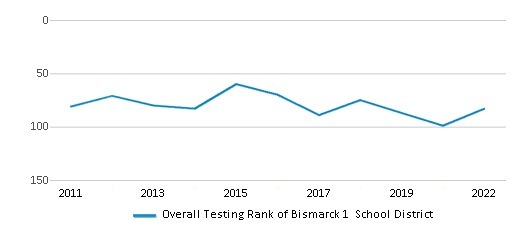
Math Test Scores (% Proficient)
43%
39%
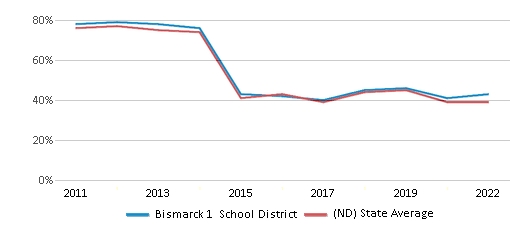
Reading/Language Arts Test Scores (% Proficient)
45%
44%
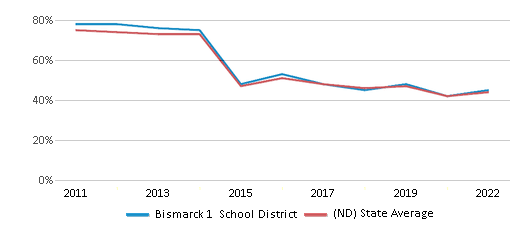
Science Test Scores (% Proficient)
46%
44%
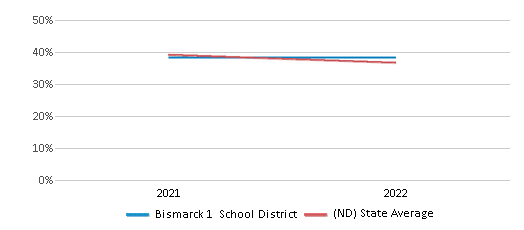
Graduation Rate
86%
85%
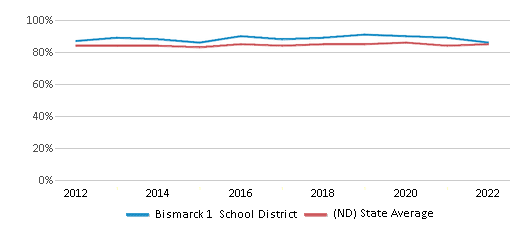
Students by Ethnicity:
Diversity Score
0.41
0.43
# American Indian Students
980 Students
3,578 Students
% American Indian Students
7%
11%
# Asian Students
160 Students
278 Students
% Asian Students
1%
1%
# Hispanic Students
653 Students
2,118 Students
% Hispanic Students
5%
6%
# Black Students
401 Students
886 Students
% Black Students
3%
3%
# White Students
10,724 Students
24,133 Students
% White Students
76%
75%
# Hawaiian Students
159 Students
69 Students
% Hawaiian Students
1%
n/a
# Two or more races Students
1,029 Students
1,300 Students
% of Two or more races Students
7%
4%
Students by Grade:
# Students in PK Grade:
374
3,099
# Students in K Grade:
993
4,293
# Students in 1st Grade:
1,041
4,417
# Students in 2nd Grade:
1,124
4,422
# Students in 3rd Grade:
1,083
4,354
# Students in 4th Grade:
1,042
4,213
# Students in 5th Grade:
1,035
4,044
# Students in 6th Grade:
1,063
2,468
# Students in 7th Grade:
1,029
510
# Students in 8th Grade:
1,021
542
# Students in 9th Grade:
1,158
-
# Students in 10th Grade:
1,139
-
# Students in 11th Grade:
1,042
-
# Students in 12th Grade:
962
-
# Ungraded Students:
-
-
District Revenue and Spending
The revenue/student of $15,453 in this school district is less than the state median of $17,615. The school district revenue/student has stayed relatively flat over four school years.
The school district's spending/student of $15,269 is less than the state median of $17,617. The school district spending/student has stayed relatively flat over four school years.
Total Revenue
$218 MM
$2,154 MM
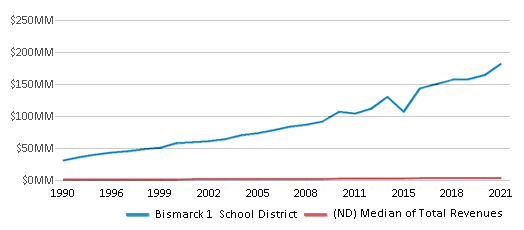
Spending
$215 MM
$2,154 MM
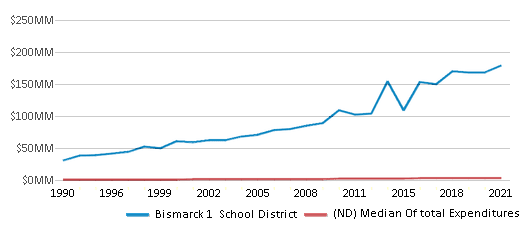
Revenue / Student
$15,453
$17,615
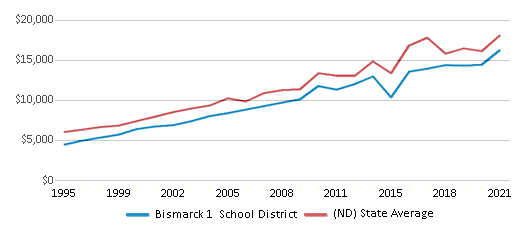
Spending / Student
$15,269
$17,617
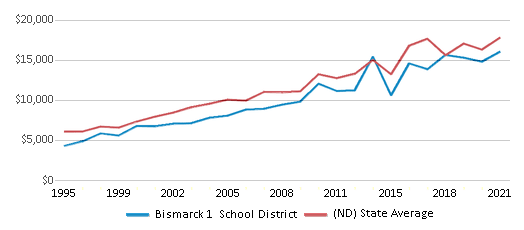
Best Bismarck 1 School District Public Preschools (2025)
School
(Math and Reading Proficiency)
(Math and Reading Proficiency)
Location
Grades
Students
Recent Articles

What Is A Charter School?
Explore the world of charter schools in this comprehensive guide. Learn about their history, how they operate, and the pros and cons of this educational innovation. Discover key facts about charter schools, including admission policies, demographics, and funding, as well as what to look for when considering a charter school for your child.

10 Reasons Why High School Sports Benefit Students
Discover the 10 compelling reasons why high school sports are beneficial for students. This comprehensive article explores how athletics enhance academic performance, foster personal growth, and develop crucial life skills. From improved fitness and time management to leadership development and community representation, learn why participating in high school sports can be a game-changer for students' overall success and well-being.

February 05, 2025
Understanding the U.S. Department of Education: Structure, Impact, and EvolutionWe explore how the Department of Education shapes American education, from its cabinet-level leadership to its impact on millions of students, written for general audiences seeking clarity on this vital institution.





